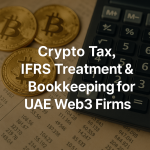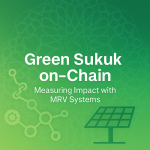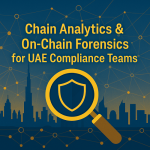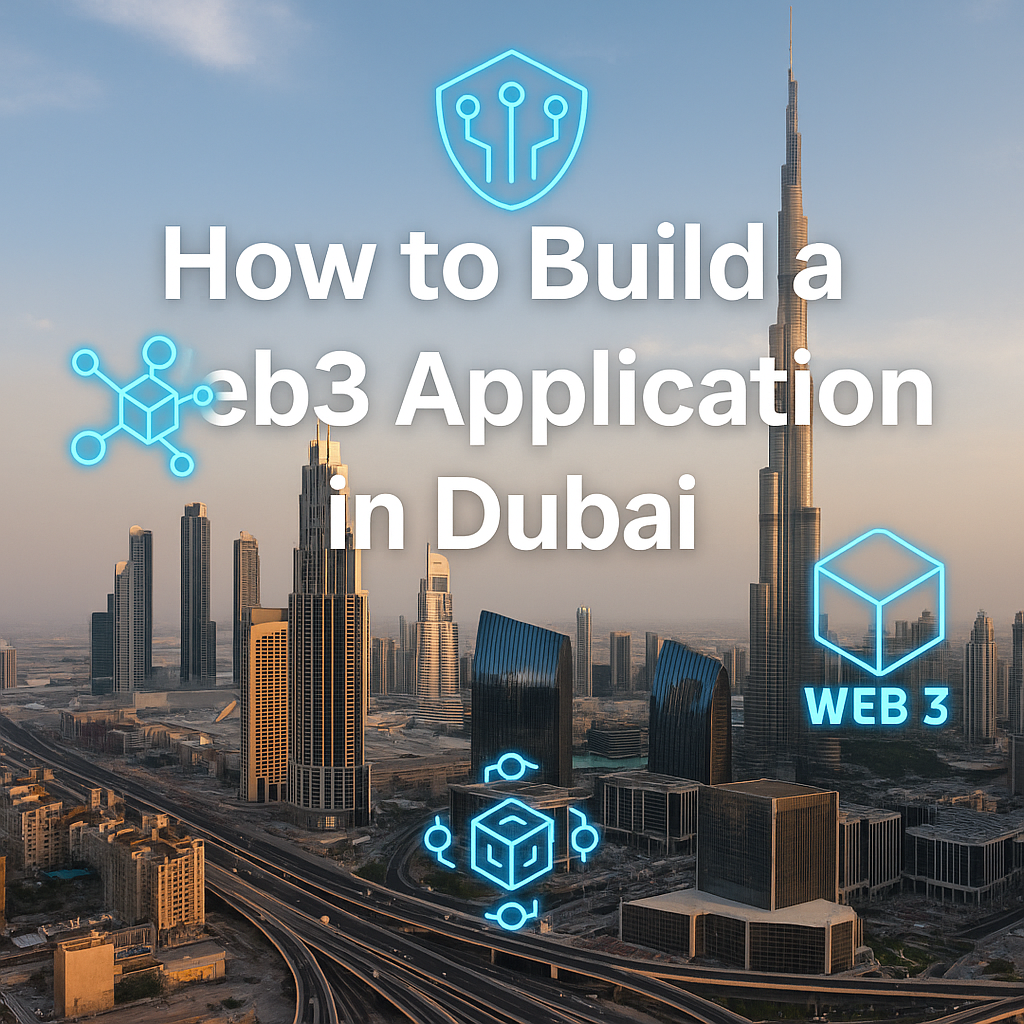Table of Contents
- Introduction
- Why Build a Web3 App in Dubai?
- Step 1: Define the Use Case and Tokenomics
- Step 2: Choose the Right Blockchain Platform
- Step 3: Ensure Regulatory Compliance
- Step 4: Develop Smart Contracts
- Step 5: Build the Frontend and Backend Infrastructure
- Step 6: Integrate Wallets and Web3 SDKs
- Step 7: Test and Audit Your Web3 App
- Step 8: Launch, Monitor, and Scale
- Conclusion
- Bring Your Web3 Vision to Life in Dubai with Websima
Introduction
Web3 is revolutionizing digital economies by enabling decentralized ownership, trustless transactions, and permissionless innovation. Dubai has strategically positioned itself as a global hub for Web3 and blockchain development, attracting founders, DAOs, NFT marketplaces, and fintech innovators.
As of 2024, Dubai hosts over 700 blockchain companies, and the Middle East and Africa blockchain market was valued at USD 871.3 million in 2022, with projected growth at a CAGR of 88.9% from 2023 to 2030, reaching around USD 131 billion by 2030 (Verified Market Research, Grand View Research).
Dubai, here we come!@Web3Ling, Co-founder of @WORLD3_AI, will be hosting the Dubai AI & Web3 Innovation Summit alongside top minds from @SuiNetwork, @WalrusProtocol, BytePlus and more.
This event dives into the future of decentralized intelligence — where AI meets… pic.twitter.com/BO2S314QGd
— WORLD3 (@WORLD3_AI) April 22, 2025
The future of Web3 and blockchain in the UAE seems to be bright, so if you’re ready to build a Web3 app in Dubai, this guide will walk you through every step—from legal structuring and platform selection to coding, wallet integration, and launch.
Why Build a Web3 App in Dubai?
Dubai provides one of the world’s most advanced environments for building and scaling Web3 applications:
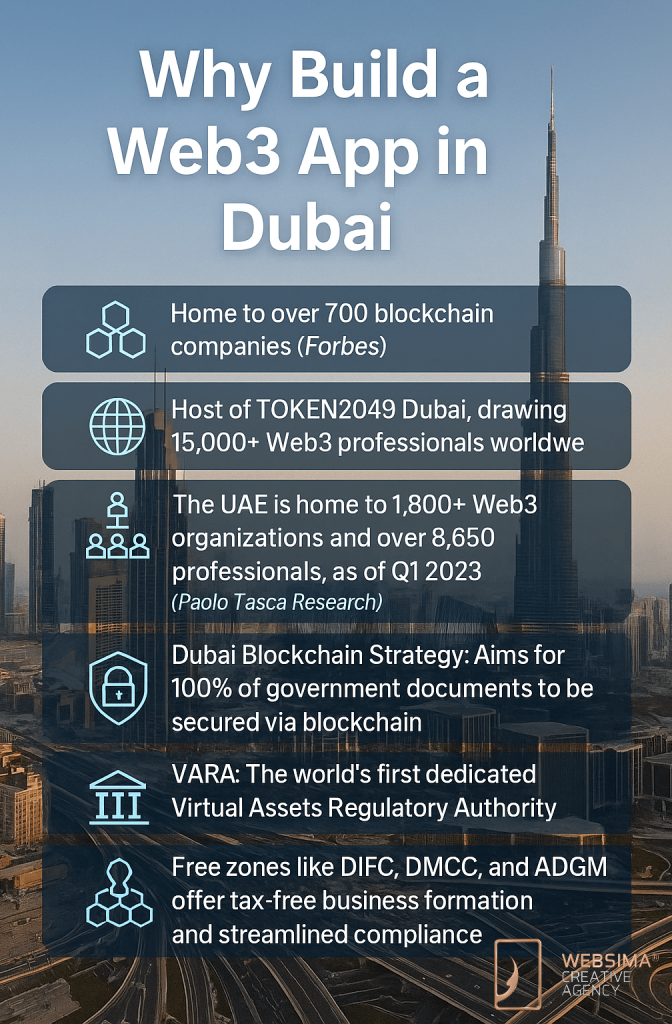
- Home to over 700 blockchain companies (Forbes)
- Host of TOKEN2049 Dubai, drawing 15,000+ Web3 professionals worldwide (Reuters)
- The UAE is home to 1,800+ Web3 organizations and over 8,650 professionals, as of Q1 2023 (Paolo Tasca Research)
- Dubai Blockchain Strategy: Aims for 100% of government documents to be secured via blockchain
- VARA: The world’s first dedicated Virtual Assets Regulatory Authority
- Free zones like DIFC, DMCC, and ADGM offer tax-free business formation and streamlined compliance
Dubai is an ideal place for Web3 development agencies, by providing a legal and easy ecosystem for this new and evolving technology.
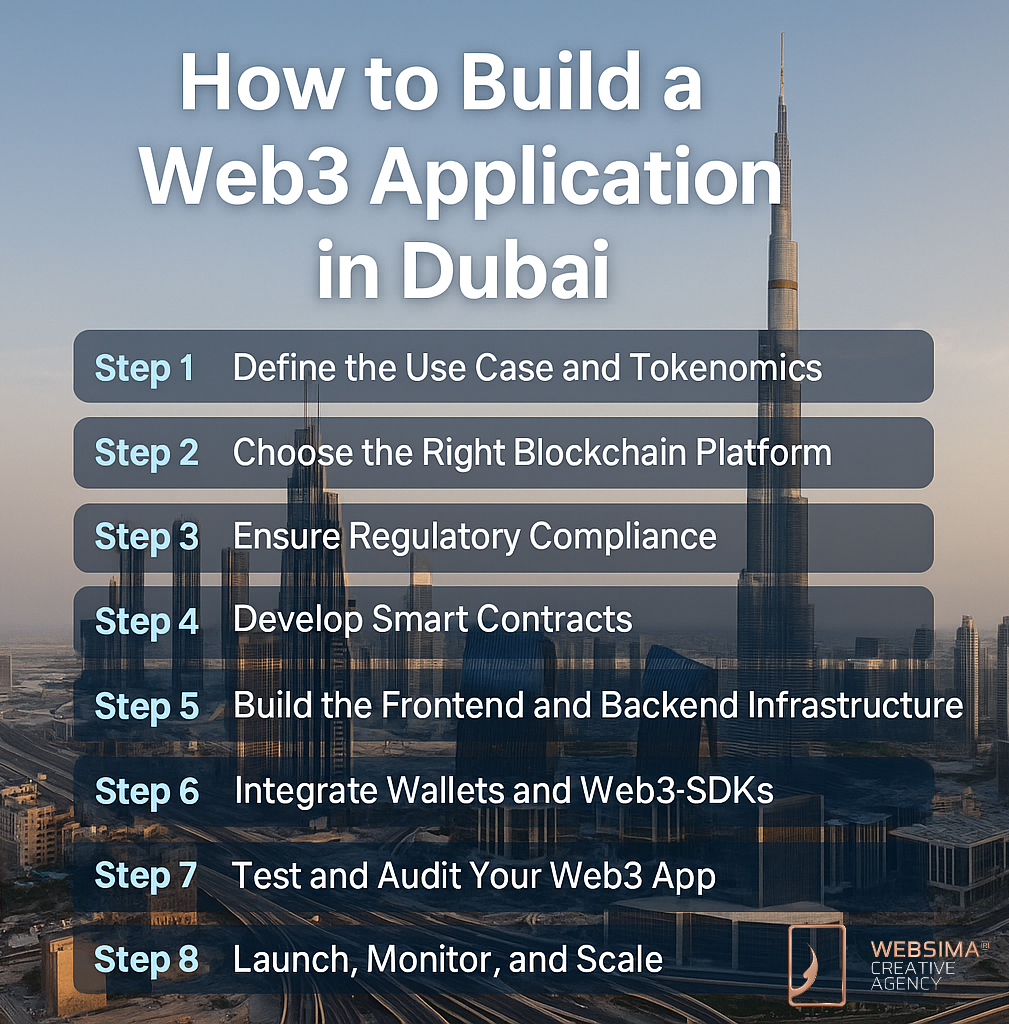
Step 1: Define the Use Case and Tokenomics
Every great Web3 app starts with a purpose. Are you solving:
- Asset fractionalization via NFTs?
- Decentralized governance through DAOs?
- Financial services via DeFi?
- Digital identity or rewards automation?
Once your use case is clear, design your tokenomics:
- Token type: utility, governance, or hybrid
- Total supply and minting schedule
- Use of tokens: access, staking, voting, etc.
- Vesting schedules and burn mechanisms
A well-designed token economy is vital for user trust and investor confidence.
Step 2: Choose the Right Blockchain Platform
Dubai developers often work with:
- Ethereum – Most secure, supported by VARA
- Polygon – Gas-efficient and EVM-compatible
- Solana – High-speed, ideal for gaming and media dApps
- BNB Chain – Fast and widely adopted
- Avalanche – Supports customizable subnets for enterprises
For government-aligned projects or VARA licensing, Ethereum and Polygon are the most compliant paths.
Step 3: Ensure Regulatory Compliance
Key Compliance Factors:
- VARA Licensing – Mandatory for all NFT, DeFi, and crypto-enabled apps (VARA)
- Free Zone Registration – Recommended zones: DMCC, DIFC
- Legal Assistance – Law firms like APE.Law help with risk assessment, KYC/AML, and licensing
- Example: DKK Digital secured full VARA licensing in 2024
Step 4: Develop Smart Contracts
Smart contract languages include:
- Solidity – Ethereum, BNB Chain, Polygon
- Rust – Solana, NEAR
- Vyper, Cairo – For zero-knowledge and L2 chains
Key considerations:
- Modular, upgradeable code
- Gas optimization
- Testing and fallback safety
- DAO-ready logic and voting mechanisms
Use Hardhat, Foundry, and OpenZeppelin libraries to reduce time-to-market.
Step 5: Build the Frontend and Backend Infrastructure
Frontend Tools:
- React.js / Next.js
- Tailwind CSS
- Ethers.js or Web3.js
Backend & Storage:
- Node.js, Express
- IPFS / Filecoin – NFT and media file storage
- The Graph – Index and serve smart contract data
- Infura or QuickNode – RPC provider
Step 6: Integrate Wallets and Web3 SDKs
Wallets to integrate:
- MetaMask
- WalletConnect
- Phantom – for Solana dApps
- RainbowKit – sleek Ethereum wallet UI
Backend SDKs:
Step 7: Test and Audit Your Web3 App
Before mainnet deployment:
- Test using Hardhat, Foundry, or Remix
- Conduct manual and automated audits
- Use Slither, MythX for static analysis
- Consider CertiK, Hacken, or ConsenSys Diligence
- Launch a bug bounty with Immunefi
Step 8: Launch, Monitor, and Scale
After going live:
- Use Dune Analytics or Nansen for on-chain metrics
- Incentivize with staking, token rewards, loyalty NFTs
- Build communities via Discord, Telegram, Snapshot
- Consider setting up a DAO for participatory governance
- Use UAE’s zero tax zones to attract international investors
Conclusion
Dubai has firmly established itself as a premier global destination for Web3 innovation, offering a rare combination of visionary governance, forward-thinking regulation, and digital infrastructure. With strategic support from government bodies like VARA and DIFC, plus world-class free zones like DMCC, the city enables founders and developers to build, launch, and scale Web3 apps faster and more securely than almost anywhere else.
From securing licensing and choosing the right blockchain platform to deploying smart contracts and integrating Web3 wallets, building a dApp in Dubai is no longer a speculative venture—it’s a strategic business move backed by a rapidly growing ecosystem.
More importantly, Dubai’s zero income tax policies, its commitment to blockchain across public services, and its massive investment in talent attraction and digital sovereignty make it an ideal hub not only for regional dominance but for global scalability. Whether you’re launching an NFT marketplace, a DeFi protocol, a DAO-driven community, or a cross-chain infrastructure project, Dubai offers the regulatory clarity, technical support, and investor access required for long-term success.
Bring Your Web3 Vision to Life in Dubai with Websima
At Websima, we specialize in building scalable, regulatory-compliant Web3 applications—from concept to code.
- Smart contract development
DAO and token integration
Legal setup with VARA and DIFC
NFT marketplace development
Web3 wallets and dApp UI/UX
Cross-chain and oracle integrations
We help founders turn ideas into protocols. Let Dubai be your Web3 launchpad.
Book a consultation with Websima to start building your next-generation blockchain app.

